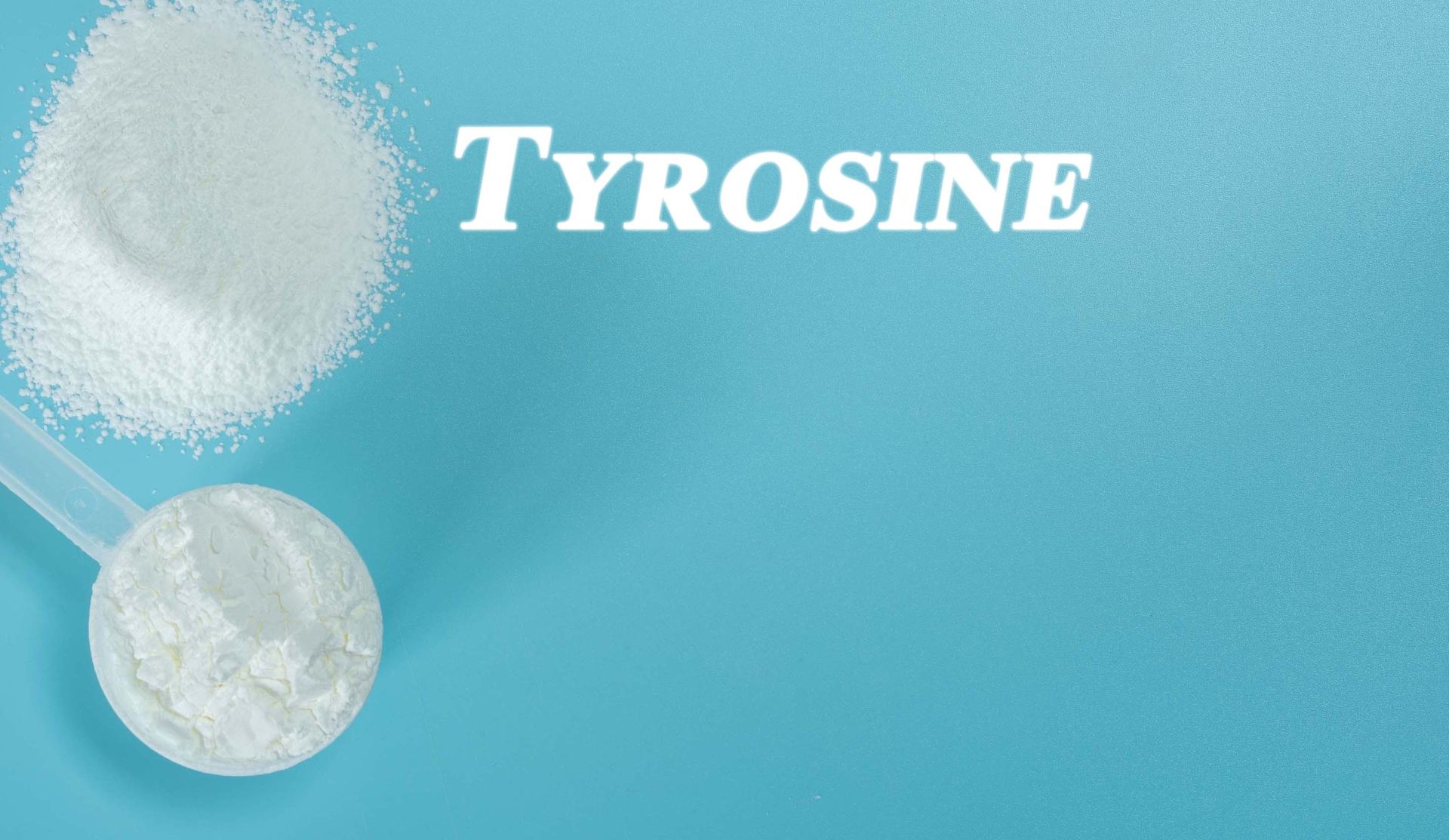Benefits of tyrosine use - what are the effects?

Many people use tyrosine supplementation, it is quite a popular choice. There is a lot of information about the benefits of tyrosine in the professional literature, but also in less professional media. They mainly include effects on cognitive function, mood and reduction of stress symptoms. But are users supplementing it correctly? Do they know what type of tyrosine supplementation gives optimal effects? In this article, we'll discuss how tyrosine can be used and what health benefits to expect from it. Read to the end!
- What health benefits can tyrosine supplementation provide?
- How to supplement tyrosine for best results?
- What to watch out for?
- Summary
What health benefits can tyrosine supplementation provide?
The health benefits come mainly from tyrosine activity in the brain. Although we use it throughout the body, when we take it from a supplement, we count on it being efficiently transported to the brain, and there in neurons used to build neurotransmitters. Let's find out what specific benefits a tyrosine supplement can provide us with in practice.
Gives benefits when dealing with excess stress
A large amount of stress depletes the body's supply of catecholamines. Consequently, the need for tyrosine increases, as these stores need to be replenished on an ongoing basis. With a standard supply of tyrosine and phenylalanine (the amino acid from which tyrosine is formed) and the onset of severe stress, there can be a temporary dip in the availability of dopamine and norepinephrine. This can underlie the occurrence of some of the symptoms that accompany severe stress, such as mood disorders and decreased motivation (You can read more about its effects on mood in this topic)
"The prudent always insured," as the popular saying goes. The same is true here, if a prudent person can predict that he will soon encounter some stronger stress, then he can, in a way, insure himself against the consequences by including tyrosine supplementation.
This applies not only to emotional stress, but also to physiological stress. A great example is exposure to cold. There is no doubt that extreme temperatures mean severe stress for everyone. Researchers have therefore tested the effects of tyrosine supplementation in people living in Antarctica. Although supplementation in the summer did not provide clear benefits, it was already much better in the winter. Taking 12 grams of tyrosine a day in winter resulted in a 47% improvement in mood, a 28% reduction in TSH and a 6% increase in fT3. In the placebo group, instead, there was a 136% worsening of mood and an 18% increase in TSH.
It is popular as an energizing and procognitive supplement
The fact of being a precursor to dopamine gives tyrosine a great reputation. Dopamine is liked by everyone, after all, that's its function. And by gently stimulating its levels, you can expect to improve such aspects of brain function as motivation levels, fatigue, and clarity of thinking.
There are several studies that confirm the beneficial effects in healthy and young adults. They indicate, among other things, that ad hoc loading with tyrosine counteracts declines in working memory and information processing caused by demanding situational conditions, such as extreme weather or cognitive load. The buffering effect of tyrosine on cognitive function was explained precisely by tyrosine's ability to neutralize reduced levels of catecholamines in the brain.

May give an extra pre-workout boost
Exercise is a stressor that can use up sizable deposits of catecholamines. A drop in these at the end of a workout could sabotage your motivation to exercise and reduce your total training load. Although tyrosine is not a typical ergogenic, using it before a workout or competition seems like a great use, sensationally covering its potential.
Comprehensive pre-workout supplements further take advantage of synergies between tyrosine and other ingredients that affect metabolism and catecholamine action in other ways.
How to supplement tyrosine for best results?
There is no one-size-fits-all recipe in this case. There are several parameters that can be adjusted for you, such as the choice of tyrosine form, dosage, or supplementation regimen. You can also get better results by using thoughtful combinations of several different supplements.
Choosing a form of tyrosine
Tyrosine is available on the market in two forms:
The latter form is usually more readily chosen to support cognitive abilities.
Tyrosine dosage
There are two ways to supplement with L-tyrosine:
- daily supplementation with low doses,
- ad hoc use of slightly higher doses a few tens of minutes before a stressor occurs.
It seems that the first way is much more popular among general users of tyrosine supplements, but it is the second way that is more often tested in clinical trials. It seems that it is the ad-hoc use of larger amounts of the amino acid that may give better results, although this may depend on the individual and their expectations.
For free L-tyrosine, ad-hoc doses in the range of 100-150 mg per kg of body weight, up to 300 mg/kg at times, are most commonly used in clinical trials. For an 80-kg person, this would be 8 to 12 grams of L-tyrosine per serving.
When L-Tyrosine or NALT is used daily as part of supplementing the building blocks for dopamine over a somewhat longer period, much smaller doses in the 500-2000 mg range are typically used.
After oral intake, peak blood tyrosine concentrations occur after about 2 hours. The elevated concentration can then persist for up to 8 hours.
Take advantage of synergies
Tyrosine can be combined with other supplements to enhance the effects. If the goal is to increase energy and motivation levels and improve cognitive abilities, tyrosine can pair well with extracts of Rosacea or Korean Ginseng. Both plants increase the availability of excitatory catecholamines, complementing the effects of tyrosine in this regard.
Just remember to test first how the individual supplements work for you when used separately before trying such combinations. If they don't produce any disturbing effects, and you feel the action could be better, then try synergistic combinations.
From milder-acting "boosters" for tyrosine can be mentioned:
- vitamin B6 - participates in the dopamine synthesis pathway;
- EGCG from green tea - allows you to potentially increase the amount of dopamine produced in the brain, instead of in peripheral tissues.
What to watch out for?
Yyrosine supplementation can be forgiven if you notice yourself hyperactivity, difficulty quieting down, etc., or if you have been diagnosed with hyperthyroidism. In such cases, increasing the supply of tyrosine will not help, it could even make the condition slightly worse.
You also need to pay attention to potential interactions with medications. Monoamine oxidase inhibitors and dopamine and norepinephrine reuptake inhibitors can be problematic.
With the above in mind, it is worth keeping an eye on the balance between dopamine and serotonin. These two "happiness neurotransmitters" compete with each other to some extent. If we stimulate dopamine production for a long time, there is a possibility that serotonin availability will deteriorate.
There are also indications that tyrosine works better in young adults than in seniors. Even a slight deterioration in some aspects of cognitive function has been noted in older adults (>61 years). This is most likely due to the fact that tyrosine metabolism changes with age, and you may then respond to it differently.
Summary
Try tyrosine supplementation when you frequently have severe stress that hinders your functioning. Even a one-time top-up with tyrosine before such stress can allow you to better withstand its effects. Such a regimen works well before workouts, before demanding mental work, studying, or before exposure to harsh conditions such as in the mountains, among others. Daily supplementation with smaller doses can also claim benefits, but there is much less information on such a supplementation regimen in clinical studies.
Sources:
 ⮜ Previous article
⮜ Previous article
Vitamin D3 and K2 - properties and synergy of action
 Next article ⮞
Next article ⮞